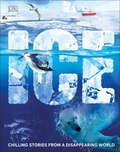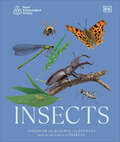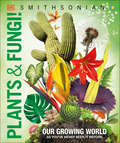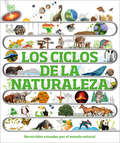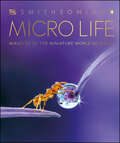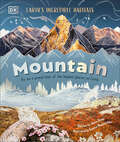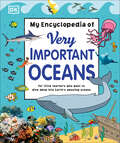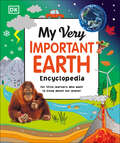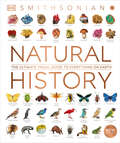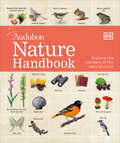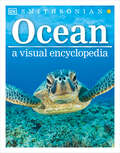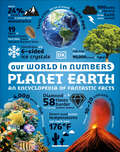- Table View
- List View
Hábitats del mundo (Habitats of the World): Un viaje por los ecosistemas de la Tierra
by DK- Contiene 14 impresionantes ilustraciones CGI a doble página, repletas de la vida vegetal y animal.- Este maravilloso formato ha vendido más de 770.000 ejemplares en todo el mundo.Un viaje ilustrado a través de los hábitats más sorprendentes de la Tierra, desde bosques y océanos hasta desiertos y polos helados.Ilustrado con increíble detalle, Hábitats del mundo explora los principales ecosistemas de la Tierra y las diferentes comunidades de animales y plantas que viven en cada uno. Desde una abundante selva tropical hasta las condiciones hostiles de alta montaña o los polos helados, descubre cómo los animales y las plantas se adaptan a su entorno y cómo interactúan con su entorno y entre ellos.------------------------- Shows 14 panoramic CGI artworks show each major habitat teeming with life.- In the same lavish, landscape format as the successful Through Time series, which has sold over 770,000 worldwide.Beautifully detailed panoramic artworks show each major habitat teeming with life—each scene is packed with drama and intricate details to pore over.
I Can Grow a Flower (Life Cycle Board Books)
by DKA first garden story board book that reveals how plants grow with lift-the-flaps and a pullout height chart.Teach your child how a tiny seed grows into a flower in this fascinating lift-the-flap garden story. A pullout height chart ends the book--a great way for children to remember how a sunflower grows, and to measure how fast your child grows, too! Through illustrations, photography, and flaps, sixteen delightful board book pages reveal the wonder of how plants grow as you follow the story of a mystery seed. How was it planted? What does it need? What will it become? As days go by, it's hard to imagine the tiny shoot will ever grow into a big, strong plant. Could it magically become the tallest of all the garden flowers? Flaps unfold to show plants growing, creatures hiding, and what's happening underground. The book includes very simple gardening projects and facts about garden creatures (which ones are good for plants, and which ones are bad), and children will find out what a pollinator is, and how to attract pollinators to the garden. The perfect gift for aspiring gardeners, complete with a height chart.
Ice: Chilling Stories from a Disappearing World
by DKFrom the mighty mammoths and deserts of ice to early explorers and polar survival, come face to face with one of Earth's greatest resources: ice.With captivating CGIs, illustrations, and photography, DK's Ice will take readers on an epic journey from the ice age to modern day, exploring how icy worlds are created, how creatures live in these harsh environments and the impact of climate change.Learn about early humans and how they survived in one of the most hostile environments on Earth, the tragic and treacherous journeys of early polar explorers, how icy landscapes develop and change, and meet the animals who make these frozen lands their home. Detailed annotations explore the place of ice on our planet and how we and other animals survive and interact with it. Ice is the perfect companion for any reader who wants to discover frozen worlds and the creatures that make them their home.
Insects: Discover the Science and Secrets Behind the World of Insects
by DKDiscover the fascinating stories behind 300 species of insects and explore their world.Did you know that insects are essential to life on Earth? Without them, we simply couldn't exist—they pollinate our crops, break down dead matter, and play a vital role in our ecosystems. Yet their numbers are plummeting in the face of changing climates, pesticide use, and threats to their essential habitats. This cutting-edge book, grounded in the latest research by the Royal Entomological Society, teaches you all you need to know about bugs, beetles, butterflies, and more—revealing how vital they are to us and we are to them.From a look at Ancient Egyptian beekeeping, to the use of insects in medicines, to their importance in art and literature, this fascinating book knits together science, food, culture, and natural history.With advice on spotting insects in a range of habitats, species identification notes, a guide to attracting beneficial insects to your outdoor space, and more, this book is the ultimate wildlife lover's companion.
Knots: The Complete Visual Guide
by DKThe ultimate visual guide to all types of knots. Avoid getting yourself into a tangle by following detailed step-by-step instructions that show you how to tie and untie more than 100 knots. Whichever knotty scenario you find yourself in, from in your own garden, to up in the mountains or across seas, this reference book will take you from novice to expert rope tier.Covering more than 100 knots for climbing, sailing, horse-riding, survival camping, and fishing as well as for gardening, DIY, medical, and even decorative purposes. The photographs of every step use strands of rope in different colors - so you can clearly see how to tie each knot. You&’ll learn all about the fascinating stories behind how many of these knots were first tied as well as their original functions in this knot tying book. Each knot has simple to follow instructions on the features and benefits and what they can be used for. Includes knots such as figure-of-eights, reef knots, highwayman&’s hitches, and monkey&’s fists. Find out about techniques like sheer lashing and the constrictor knot. The book begins by teaching you all about rope materials and construction and how to maintain them. At the end of the book the glossary and index so you can easily find just the knot you&’re in need of. There are more than 1,000 photographs, illustrations, and artworks. Expert author Des Pawson is a founding member of the International Guild of Knot Tyers.One-Stop Practical Guide to Tying and Using KnotsKnots: The Complete Visual Guide is arranged by chapters covering Stopper Knots, Binding Knots, Bends, Hitches, Loops, Plaits & Sennits, and Splices & Whippings. It also includes detailed instructions for over 100 knots and fantastic beginner guides to help boy scouts, girl scouts, first-time climbers and everything in between become experienced campers, sailors, and mountaineers.Inside this visual guide, you&’ll find: • Accessible text and tables that explain the features and benefits of each knot • Sequence spreads display the top five knots you need for a range of purposes, from sailing and fishing to gardening and gift-wrapping • Fun facts about the oldest knots and their history • Essential information on how to choose the best rope to use and how to maintain them More from DK Books:Don&’t miss out on more fascinating visual reference books! Look for The Complete Sailing Manual, How to Garden, and The Survival Handbook from DK Books to build on your new-found knot skills.
Knowledge Encyclopedia Plants and Fungi
by DKExplore the wonderful world of plants and fungi, with everything from cacti and carnivorous plants to trees, flowers, and mushrooms.Why are flowers colorful and fruits sweet? How does a carnivorous plant kill its prey? Why do stinging nettles sting? How do trees turn light into food? This ultimate nature book for children will fascinate young readers with its microscopic detail and amazing facts on the plant world. Children aged 9+ will find themselves totally absorbed in the complexities nature, made clear through engaging explanations, intricate illustrations, vivid photographs, and striking 3D images. Knowledge Encyclopedia: Plants and Fungi! teaches kids all about plants and fungi by showing how they work with beautiful illustrations. Peer inside a leaf, watch a seed sprout, follow a root underground, and see how a flower becomes a fruit.This all-encompassing nature encyclopedia for kids offers: A whole collection of facts, charts, timelines, and illustrations that cover a vast range of topics.Plants and fungi from around the world shown using amazingly detailed CGIs that entice young readers to dive in and explore.Important STEM topics covered in life sciences curricula.A visual approach using illustrations, photographs and extremely detailed 3D CGI images.Knowledge Encyclopedia: Plants and Fungi! shows how plants and fungi form the foundations of every ecosystem, making our planet habitable. Life on Earth couldn&’t exist without plants and fungi. Plants create the food we eat and the oxygen we breathe. They regulate the climate, provide habitats for animals, and produce sustainable resources that we can use to make books, clothes, furniture and houses. Fungi are just as important.Every page is packed with incredible facts and statistics. Did you know that the seeds of the Australian snottygobble plant don&’t grow until they&’ve been pooed out by emus? Or that the world&’s oldest tree began growing before the pyramids were built?More in the SeriesKnowledge Encyclopedia Plants and Fungi! is part of DK&’s visual and informative Knowledge Encyclopedia series. Complete the collection and dive into the deep with Knowledge Encyclopedia Ocean!, take a trip to the solar system with Knowledge Encyclopedia Space! and travel back to prehistoric times with Knowledge Encyclopedia Dinosaur!
Let's Get Gardening
by DKIn this colorful guide featuring 30 easy gardening projects, kids will learn to grow their own fruits and vegetables, attract wildlife such as butterflies and bees, and recycle household items into animal habitats and fun decorations. Whether they've got a big backyard or just a windowsill, kids can grow all sorts of plants with this beginner's gardening book.Packed with step-by-step activities, this book teaches children ages 5-8 how to grow garden staples like tomatoes, pumpkins, and zucchini with photographic examples. Each project includes a complete materials list, planting guide, and tips on harvesting your fruits and vegetables, providing plenty of support for kids from start to finish. The book also offers advice on creating creature-friendly spaces within your garden, such as a bee hotel, a ladybug sanctuary, and a home for frogs and toads. By caring for the wildlife around them, kids can grow to better understand the relationship between humans and nature, and how we can support local habitats wherever we happen to live. Beyond the gardening basics, Let's Get Gardening also helps kids learn about conservation, recycling, and sustainability through simple, hands-on projects. From making mini greenhouses out of leftover glass jars, to growing strawberries in an old pair of rain boots, to repurposing an empty milk carton as a hanging bird feeder, there are so many practical ways for kids to help cut waste and reduce pollution. So grab your potting soil and let's get gardening!
Life Underground: Tunnel into a World of Wildlife (DK Panorama)
by DKGo on an illustrated journey through nature&’s unseen habitats in this kids&’ book about life under the earth.Teeming with animal life, this book shows how life on Earth is interconnected and thriving in more places than you might think! Children aged 7-11 will be fascinated by what goes on under their feet, learning about the incredible diversity of life on planet Earth.Life Underground takes children on an illustrated journey into the world&’s most amazing underground habitats, from warm Arctic warrens to sandy desert dens. Explore the different communities of animals and plants that live under the Earth, from the succulent soil of an Australian forest to the hard ground at the icy north. Find out how animals and plants are adapted to their environment and how they interact with their surroundings and each other.This nature book for children offers: - Material that supports the science curriculum in schools up to Grades 3-5 – perfect for nature-loving children aged 7–11, and reluctant readers.- A look at Earth&’s major underground habitats and shows the animals that live there. - Beautifully detailed panoramic artworks show each underground scene teeming with life, with burrowing animals placed around the edge of the page for readers to find in the illustration.This illustrated guide lets children tunnel into a world of wildlife and explore different habitats, whilst teaching about different animal species and where they live. Details are drawn out from the artwork so that each habitat is easy to follow, making this the ideal nature book to have on your shelf.
Look I'm an Ecologist (Look! I'm Learning)
by DKTwenty step-by-step eco-projects for budding preschool ecologists!Calling all mini eco-warriors and their parents! This fun and exciting book is filled with nature-themed eco-projects for kids. It's a gentle introduction to topical issues in the world today, like climate change, conservation and recycling - ideal for curious kids who want to make a difference.Look, I'm an Ecologist allows young readers to do what they do best: imagine, create, learn, problem-solve, and play their way to a greener planet. Inside you'll find:- A wide range of activities with an environmental focus is supported by simple information, so young readers understand the issues faced by our planet in a play-based, hands-on and child-friendly context.- Easy-to-find and internationally available materials and resources.- Projects designed to be shared and enjoyed by children and parents or carers.- Visual step-by-step instructions allow young children to access every part of the activity - from set-up to sensory exploration and conclusion, making them actively responsible for their learning. - An expertly written book by environmentalist and zoo learning manager Cathriona Hickey, who has vast experience in communicating science and ecology topics to young children.This charming arts and crafts book for kids will help them discover that they already have what they need to become an ecologist: a curious mind, unlimited imagination and super senses! Little ones can explore a wide range of projects, including building a bird feeder, making compost, painting pebbles, weaving a spider's web, growing plants and even building a model of a rockpool!The practical activities support preschool and kindergarten curriculums with clear pictures and easy-to-follow instructions. This nature book for kids will show them how fun it is to be green and use their senses to explore the natural world!DK's Look! I'm Learning series of exciting and educational STEM books, focusing on the sensory experience of practical learning and play and finding science in everyday activities. Hands-on learning experiences tap straight into kids' insatiable curiosity and sense of wonder. Try the other titles in the series next, including Look I'm A Cook, Look I'm A Maths Wizard, and Look I'm An Engineer.
Los ciclos de la naturaleza (DK Children's Timelines)
by DKDescubre la increíble naturaleza de nuestro planeta a través de cronologías, imágenes y fotografías.Si alguna vez te preguntaste cómo será la rutina de un chimpancé, qué sucede durante las 24 horas del día en un desierto, o cuánto dura el embarazo de un canguro, este libro es para ti. Timelines of Nature te muestra la historia natural de nuestro planeta y los ciclos vitales de los seres vivos que lo habitan a través de detalladas líneas temporales y divertidos elementos visuales.En su interior, encontrarás:-Líneas de tiempo que ayudan a visualizar de forma fácil en el tiempo el desarrollo de la historia del mundo natural, desde el Big Bang y el origen de las plantas hasta la extinción de los dinosaurios.-Contenido dividido en cuatro temas principales: la Tierra, las plantas, los hongos y los animales-Esquemas y explicaciones sobre lo que sucede es el transcurso de un año en diferentes hábitats, en el ciclo vital de una planta o en el día a día de un animal.-Información y datos curiosos de los momentos y sucesos más extraordinarios de la geología, la fauna y la flora, como una mariposa saliendo de su crisálida.-Fascinantes fotografías e ilustraciones realistas de la naturaleza.¡Observa qué pasa en el planeta minuto a minuto, hora a hora y día a día en cada mes del año! Descubre cuántos años tardó la Luna en formarse, las etapas de crecimiento de diferentes animales y cómo ha evolucionado la vida desde los primeros organismos unicelulares. El recurso perfecto para estudiar biología.Discover the fascinating history of our planet with this unique collection of visual timelines.Full of exciting visual timelines covering minutes, hours, days, weeks, months, and years, Timelines of Nature reveals our planet’s natural history and its life cycles in an entirely new way. Beginning at our world’s existence; children aged 9+ will learn how many years it took the Moon to form and witness Earth’s continents collide. Discover the history of Earth’s most spectacular features – from the Grand Canyon to the Sahara desert. See how life evolved, from the first single-celled organisms to the extraordinary variety of creatures living today. Then we look at life on Earth today. Every species on Earth has its own unique story – Timelines of Nature reveals these weird and wonderful life cycles through fascinating visual timelines. It tells you what’s really happening on Earth each minute of every day. This beautiful nature book for children features:- Beautiful timelines teach young readers all about geology, plants, and animals.- Each timeline is unique and depicts a different topic, such as the story of how whales evolved, how the Moon was formed, or how a tiger spends its day.- Feature pages highlight climactic moments in nature, for example, the butterfly finally emerging from its chrysalis.- Supporting educational boxes on each page explain key points about nature, helping kids to discover more about the world around them.Children can marvel at a variety of different timeframes in nature, like geological timelines spanning thousands of years; a year in the life of a habitat, a day in the life of an animal, and complete plant life cycles.
Micro Life: Miracles of the Miniature World Revealed (DK Secret World Encyclopedias)
by DKExplore the miracles of the microscopic world.Find out all about the unique and beautiful kingdoms of life at a microscopic scale and how every organism meets the challenges of survival no matter its size. The perfect book for people who enjoy photography, nature and biology.Inside the pages of this exciting educational nature book, you&’ll find: • Microscopic life-forms (often neglected), and their life-forms in extreme close-ups, revealing details such as nerve cells and hair follicles. • Artworks support the beautiful images, providing a deeper insight into structure and function and building a picture of how living organisms work at a microscopic level. • Comprehensive coverage of the natural world, including all the main groups of living things. • Explores overlooked groups that have a huge role in the natural world: insects, which make up 80% of the world&’s animal species, and bacteria — of which there are more in a human mouth than there are people in the world. • The book is organized according to the main functions of life: movement, reproduction, energy and feeding, sensing the surroundings, defense, etc. • Optional 80-page section containing a catalog of the major kingdoms of life. The beauty of nature under a microscopeExplore the inhabitants of an invisible world in incredible detail with this book, which contains macro photography and spectacular microscope imagery. You'll have so much information about the hidden world of intricate structures beyond the naked eye. From the tiniest spiders and insects to even microscopic creatures like bacteria and viruses, this book contains it all!See the beauty of a pollen grain, a butterfly egg, the spore of a fungus and a human&’s nerve cell in extreme close up. The amazing imagery in Micro Life contains focus-stacked macro photographs and micrographs (microscope images), including scanning electron micrographs. Illustrations in this book explain the science — from the workings of an insect&’s eye to how a plant &“breathes&” through its leaves. Micro Life is an unexpectedly breathtaking look at the natural world. Find out how life works and how organisms solve the fundamental problems of movement, reproduction, energy, communication and defense. This book belongs on the bookshelves of schools, libraries and homes for those interested in photography, nature or biology.
Mountain: Go On a Grand Tour of the Highest Places on Earth (Earth's Incredible Habitats)
by DKThis stunning book all about mountains takes children on a grand tour of the highest places on Earth.From the salt flats of the Andes to the snow-capped peak of Mount Fuji, discover 14 of the world’s most spectacular mountains and mountain ranges, and the animals and plants that live in them. The chapters cover four different types of mountains: plateaus, volcanoes, mountain ranges, and tepuis, with a selection of both famous and less-well known places within each. Every mountain or range is explored in detail, with intriguing information about its geography and flora and fauna, alongside detailed photography and beautiful illustrations. Marvel at the Great Aletsch Glacier flowing down the Alps, mountain goats scrambling across cliff faces in the Rockies, and the tiny saltwort flowers that bloom 20,000 feet up in the Himalayas. As well as the wonders of these remote areas, the threats facing mountains and their species are also investigated.Habitat: Mountains will be treasured for years to come. With foil on the cover and colorful sprayed edges, this book makes the perfect gift for any child with a passion for the natural world.
My Encyclopedia of Very Important Oceans (My Very Important Encyclopedias)
by DKA charming children's encyclopedia that takes you on a journey into the deep blue to discover the wonders of the world&’s oceans!The world is so much bigger than young minds can fathom and there is always more to learn. My Encyclopedia of Very Important Oceans is a vibrant encyclopedia for curious 5-7 year olds, who want to know everything there is to know about life on and under the waves. Easily accessible to young readers through a balance of striking images and conversational, age-appropriate text, this ocean encyclopedia will tap into every child&’s natural curiosity and answer all their biggest questions about this amazing world under the water. Bursting with up-to-date facts and discoveries, this exciting kid&’s encyclopedia includes everything from the spectacular seabirds soaring over Earth&’s vast oceans, to the tiny creatures lurking on the ocean floor. Dive in and explore forgotten shipwrecks, swim with fabulous fish and other awesome underwater animals, and weave your way through secret deepsea homes. You&’ll travel back in time to meet plundering pirates, scientists, and explorers who changed the course of history, then it&’s time to learn about lots of very important underwater jobs and how you can help to protect Earth&’s precious oceans.Celebrate your child&’s curiosity as they:- Read fun facts about weird and wonderful ocean creatures- Learn important ocean conservation efforts for awareness around the climate crisis - Discover curious creatures and incredible under-the-sea adventures Our ocean encyclopedia for children is the perfect blend of striking illustrations, fun fact files and educational stats about oceanographic life. In fact, &‘oceans&’ is an on-trend topic, with more and more wildlife books with an environmental focus seeing an increase in sales. Encourage early learners to go on a journey into under the water to explore a world of information, making this the ideal first reference book for kids aged 5-7 to enjoy for hours on end, whether shared reading with the family, or reading alone, this fun fact book for children also doubles up as the perfect gift for all young ocean lovers. Tell the story of underwater world one page at a time, by uncovering: - Educational content written in a friendly and fun manner - Beautifully padded cover with several high-quality finishes, including padding and foil- Features a built-in ribbon bookmark so you never lose your place whilst reading More in the SeriesMy Encyclopedia of Very Important Oceans is part of the educational kid&’s book series My Very Encyclopedia series. Complete the series and nurture your child's curiosity with My Encyclopedia of Very Important Adventures, teach them about different species with My Encyclopedia of Very Important Animals, or let them go back in time to when dinosaurs roamed the earth with My Encyclopedia of Very Important Dinosaurs.
My Very Important Earth Encyclopedia: For Little Learners Who Want to Know Our Planet (My Very Important Encyclopedias)
by DKA charming children's encyclopedia bursting with facts about explosive volcanoes, incredible habitats, and world-saving ideas.The world is so much bigger than young minds can fathom and there is always more to learn. My Very Important Earth is a vibrant encyclopedia for curious 5-9 year olds, with a unique approach to the subject that features both places from around the globe as well as focusing on what the world is like from a child&’s perspective, covering everyday subjects about their own experiences. Full of fun facts, colourful illustrations, and games that will keep the kids entertained time again, this children&’s encyclopedia is filled with age-appropriate knowledge on a range of topics from Earth&’s inner core to the thinnest air at the edge of the atmosphere, get ready for a round-the-world adventure! Dig down and learn exactly what is under our feet. Investigate the workings of earthquakes and volcanoes. Learn howmountains are made and how rivers form. Find out about wind, rain, and extreme weather on Earth&’s surface. Explore Earth&’s habitats, and meet the plants and animals that call them home. Finally, find out about how our planet is under threat, and what you can do to protect it.Celebrate your child&’s curiosity as they:- Read hundreds of exciting facts- Learn all about geology, habitats, conservaton- Discover the wonders of our incredible planet, and moreOur encyclopedia for children is the perfect blend of adorable, simple illustrations with stunning photography and lively text. Encourage early learners to go on a journey to explore a world of information, making this the ideal first reference book for kids aged 5-9 to enjoy for hours on end, whether for homeschooling, a bedtime story, shared reading or reading alone, this fun fact book for children also doubles up as the perfect gift for curious kids who love to learn. Tell the story of the world one page at a time, by uncovering: - Educational content written in a friendly and fun manner - Beautifully padded cover with several high-quality finishes, including padding and foil- Features a built-in ribbon bookmark so you never lose your place whilst reading More in the SeriesMy Very Important Earth is part of the educational kid&’s book series My Very Encyclopedia series. Complete the series and nurture your child's curiosity with My Encyclopedia of Very Important Adventures, teach them about different species with My Encyclopedia of Very Important Animals, or let them walk with the dinosaurs who ruled the earth before them in My Encyclopedia of Very Important Dinosaurs.
Natural History (DK Definitive Visual Encyclopedias)
by DKA spectacular and exceptionally well-illustrated guide to everything on Earth. From rocks to redwoods and microbes to mammals – this is a dazzling visual introduction to our planet&’s treasures.Filled with more than 5,000 species and in-depth studies of animals, plants, fungi, microorganisms, rocks, and minerals, it&’s the ultimate celebration of the world&’s extraordinary diversity of life. Planet Earth's eclectic wildlife and endless wonders come to life in the most spectacular way in this monumental compendium of Earth&’s natural wonders. Compiled by a team of professional wildlife experts working with the world-renowned Smithsonian Institution, this comprehensive nature book was 5 years in the making!This unrivaled visual survey of Earth's natural history looks at every kingdom of life. It is packed with thousands of eye-popping, specially commissioned photographs and in-depth two-page spreads on incredible species. The engaging and informative text was supplied by a global team of natural history experts to make this bold visual encyclopedia a perfect addition to every family bookshelf or school library.From the evolution of nature to the classification of species, Natural History begins with a general introduction to life on earth. The next chapters form an extensive and accessible catalog of species and specimens – from flowering plants to reptiles – interspersed with fact-filled introductions to each group and in-depth profile features. A True Visual Dictionary of Earth's Natural WondersNatural History squeezes as many plants, animals, rocks, and minerals as possible between its covers. This extraordinary reference book from DK Books is eye candy for nature lovers of all ages, and makes a fantastic gift!Explore everything on Earth, such as: • Living earth • Minerals, rocks, and fossils • Microscopic life • Plants • Fungi • Animals
Nature Handbook
by DKA practical illustrated guide to exploring, observing, and understanding natureChris Packham will pass on his passion for nature and make you an enthusiastic and knowledgeable amateur naturalistChris Packham&’s Nature Handbook reveals how easy it is to enjoy and learn about plants, animals, habitats, and ecological processes. It features visual studies of habitats – full of photos of the animals and plants that live there and illustrations of how they interact. All the habitats in your region (Europe in the UK edition, or North America in the US edition) are included, from accessible urban and farming landscapes to wilderness areas. This book reveals the sights, sounds, and smells you can encounter and shows you how to connect with nature without intruding. It provides illustrated guides to activities for every season. Many of these, like pond dipping and raising butterflies from caterpillars, can be done close to home and without expensive equipment. The book promotes conservation and demonstrates simple ways to contribute to the health of the natural world.First published in 2010, this edition has been extensively revised to present more local information relevant to the habitats where you live, and to include the latest equipment and conservation issues. A blend of inspirational guide, essential reference, and &“how-to&”, this book will make you wild about the natural world.
Nature's Wonderland: Animals and Plants from the US and Canada
by DKGo on a thrilling adventure and discover the amazing natural landmarks and diverse wildlife of Canada and the USA. There&’s nowhere on Earth like North America… From scorching deserts to frozen tundra, dense rainforests to coral reefs—this continent has it all! In this captivating nature book, children can take a tour of the most amazing environments across Canada and the US, the two biggest countries in North America.Children aged 7-9 can learn all about incredible natural features like Niagara Falls — and find out which North American waterfall is actually higher! Get to know the unique animals that live only in southern Florida. Find out which species can survive in Death Valley, the hottest place in the world. Full of amazing photographs and charming illustrations, this fascinating nature book is your ultimate guide to the amazing natural wonders, wildlife, and environments of Canada and the USA.This educational book for wildlife lovers features:- More than 200 entries on incredible natural landmarks, plants, and animals from across the USA and Canada- Beautiful illustrations, stunning photography, and engaging text are combined to make dynamic, scrapbook-style collage pages- Chapters each split into broad regions such as western USA, with pages that focus on significant sub-regions within the area, such as the Pacific Northwest and the Rocky Mountain- 30 feature pages that go into detail on key natural features across the regionNature&’s Wonderland is the perfect book for children who are fascinated by nature and curious about North America&’s habitats! With engaging information and absorbing photography, this book is perfect for children to explore by themselves or with an equally curious adult.
Ocean: A Visual Encyclopedia (DK Children's Visual Encyclopedias)
by John Woodward DKFrom the shimmering surface to the darkest depths, this breathtaking visual encyclopedia presents our blue planet as never before. Stunning photography, accessible information, and fascinating facts are spilling over in this essential guide to the oceans. Take a dip in all the world&’s waters to experience their incredible diversity. Make a splash in the icy Arctic waters before warming up in the tropical Indian Ocean. Experience the super size of mighty whales compared to swarms of tiny krill. Cast your eyes to the skies to see circling sea birds before diving down to meet mysterious creatures of the deep. Awash with comprehensive information and fascinating detail, Ocean: A Children&’s Encyclopedia is the perfect choice for school projects, marine enthusiasts, and water babies everywhere.
Oceanology: The Secrets of the Sea Revealed (DK Secret World Encyclopedias)
by DKDive into this uniquely elegant visual exploration of the sea An informative and utterly beautiful introduction to marine life and the ocean environment, Oceanology brings the riches of the underwater world onto the printed page.Astounding photography reveals an abundance of life, from microscopic plankton to great whales, seaweed to starfish. Published in association with the Smithsonian Institution, the book explores every corner of the oceans, from coral reefs and mangrove swamps to deep ocean trenches. Along the way, and with the help of clear, simple illustrations, it explains how life has adapted to the marine environment, revealing for example how a stonefish delivers its lethal venom and how a sponge sustains itself by sifting food from passing currents. It also examines the physical forces and processes that shape the oceans, from global circulation systems and tides to undersea volcanoes and tsunamis.To most of us, the marine world is out of reach. But with the help of photography and the latest technology, Oceanology brings us up close to animals, plants, and other living things that inhabit a fantastic and almost incomprehensibly beautiful other dimension.
Our World in Numbers: Planet Earth (DK Oour World in Numbers)
by DKLearn about everything on planet Earth with this book of extraordinary figures and number-based facts for children aged 9-12!Put the fun back into learning and take children on a number-crunching journey around our incredible planet. From microscopic minerals to majestic mountains and everything in between, learn all about planet Earth with more than 1,000 weird and wonderful numbers.Our World in Numbers: Planet Earth will have you impressing your family and friends like never before with mind-blowing figures behind rising sea levels, the gradual growth of mountains, and wild weathers. Children aged 9-12 will number-crunch their way around the planet, discovering everything about world's biggest oceans, rivers, and mountains.This Earth book of fantastic figures offers:More than 1,000 astonishing Earth facts for children aged 9-12.Different topics divided by 5 chapters that explore the planet.Eye-catching double page features, including vibrant photographs and graphics for every topic.Fun and surprising information on more than 80 topics to engage children in the world around them.This data-packed adventure through the animal world is filled with everything you’ve ever wanted to know about the planet, with full-page photographs and fun, colorful images, wacky fact-bites, and funky figures to become an animal expert! More in the seriesOur World in Numbers explores figures and number-based facts through exciting topics, vibrant photos and exciting graphics. If you liked Our World in Numbers: Planet Earth, why not try Our World in Numbers: Animals, and learn about the animal kingdom, or Our World in Numbers: Dinosaurs, and discover the prehistoric world.
Plantas de interior (Houseplant)
by DKConvierte tu casa en un oasis de interior y descubre todos los secretos para mantener tus plantas sanas y fuertes.Las plantas forman parte de la decoración de la casa, sobre todo para todos aquellos que no tienen jardín. Crea tu propio terrario, maceta colgante con macramé o una corona de suculentas, y dale vida a tu hogar gracias a este maravilloso libro sobre plantas de interior. Con explicaciones sencillas e instrucciones paso a paso, este libro es perfecto tanto para expertos en jardinería, como para principiantes con curiosidad por los beneficios que las plantas pueden aportar a su casa. Descubre las mejores especies de plantas de interior: resistentes, bonitas y fáciles de cuidar.En el interior de esta completa guía de jardinería encontrarás:-Más de 330 especies de plantas de interior, desde suculentas y cactus hasta orquídeas, bromelias e incluso plantas carnívoras.-Explicaciones sencillas sobre todos los cuidados esenciales para las plantas: riego, poda, trasplante, propagación, abono, enfermedades y plagas…-24 proyectos originales con instrucciones paso a paso.-Consejos sobre cómo decorar tu casa siguiendo un diseño de interior apoyado por los diferentes colores, texturas y formas de las diferentes plantas.Con instrucciones para ßque tus plantas crezcan sanas y fuertes, consejos para propagar plantas a través de esquejes y ampliar tu colección y 24 proyectos paso a paso diseñados para aprovechar al máximo la vegetación de tu hogar, Plantas de interior tiene todo lo que necesitas para crear, plantar y cuidar tu jardín de interior.Discover over 330 houseplant varieties and make the most of them with care advice, design inspiration, and step-by-step projects.Turn your living space into an indoor oasis with the RHS’s definitive guide to more than 330 houseplant varieties.Take your house plant collection to the next level with Houseplant. Discover the best varieties to suit your home from more than 330 profiles on every kind of houseplant you can imagine, from succulents and cacti to orchids, bromeliads, and even carnivorous plants.Complete with essential care advice to keep your plants alive and thriving, propagation tips to help you grow your collection, and 24 step-by-step projects designed to make the most of your greenery, Houseplant has everything you need to create, cultivate, and care for your indoor garden.
Plantas y hongos (Knowledge Encyclopedia Plants and Fungi!)
by DKExplora el maravilloso mundo de las plantas y los hongos, desde los cactus y las plantas carnívoras hasta los árboles, las flores y los hongos.¿Por qué las flores son coloridas y las frutas son dulces? ¿Cómo captura una planta carnívora a su presa? ¿Por qué pican las ortigas? ¿Cómo convierten los árboles la luz en alimento? Este libro sobre la naturaleza para niños fascinará a los lectores más jóvenes con detalles microscópicos y datos curiosos sobre el reino de las plantas y los hongos.En su interior, encontrarás: Datos, gráficos, líneas temporales e ilustraciones de una amplia gama de temas.Un enfoque visual único de las plantas y los hongos de todo el mundo, gracias a sus impresionantes y detalladas imágenes en 3D.Información valiosa que sirve de apoyo para los estudiantes de ciencias.¡La vida en la Tierra no podría existir sin plantas y hongos! Crean los alimentos que comemos y el oxígeno que respiramos, regulan el clima, proporcionan hábitats para los animales y producen recursos sostenibles que podemos usar para hacer libros, ropa, muebles y casas. Plantas y hongos muestra cómo estos seres vivos son los cimientos de todos los ecosistemas y hacen de nuestro planeta un lugar habitable. ¿A qué esperas para aprenderlo todo sobre los organismos imprescindibles para la vida en la Tierra?Explore the wonderful world of plants and fungi, with everything from cacti and carnivorous plants to trees, flowers, and mushrooms.Why are flowers colorful and fruits sweet? How does a carnivorous plant kill its prey? Why do stinging nettles sting? How do trees turn light into food? This ultimate nature book for children will fascinate young readers with its microscopic detail and amazing facts on the plant world. This all-encompassing nature encyclopedia for kids offers: A whole collection of facts, charts, timelines, and illustrations that cover a vast range of topics.Plants and fungi from around the world shown using amazingly detailed CGIs that entice young readers to dive in and explore.Important STEM topics covered in life sciences curricula.A visual approach using illustrations, photographs and extremely detailed 3D CGI images.Knowledge Encyclopedia: Plants and Fungi! shows how plants and fungi form the foundations of every ecosystem, making our planet habitable. Life on Earth couldn’t exist without plants and fungi. Plants create the food we eat and the oxygen we breathe. They regulate the climate, provide habitats for animals, and produce sustainable resources that we can use to make books, clothes, furniture and houses. Fungi are just as important.
Plants and Fungi: The Definitive Visual Encyclopedia (DK Definitive Visual Encyclopedias)
by DKComprehensive, accessible, and lavishly illustrated, this is an essential and timely guide to the world's key plant and fungus species.Written by specialists, Plants and Fungi is a botanical exploration of the world's most fascinating plant and fungus species, many of which are also highly valued for their ecological, economic, and cultural importance.Covering all of the main groups—from the fleeting wildflowers that bring life to deserts to the towering giant trees of tropical rainforests, and from the lichens of the Arctic to the cultivated seaweeds of Southeast Asia—the book reveals the spectacular diversity of plants and fungi, the ecosystems they support, their symbiotic relationships, and their use in everything from food to clothing and medicine.Entries explore how plant and fungus species grow and reproduce, and how they have evolved to adapt to every continent on Earth, even in the harshest of conditions, and celebrate their beauty and diversity.
Pocket Genius: Facts at Your Fingertips (Pocket Genius)
by DKDestined to be toted in school backpacks everywhere, this new encyclopedia series for young readers contains on-the-spot information in children's favorite subject areas. Kids love facts: they want to know about the biggest, fastest, tallest, and oldest everything. Full of instant information, these books feature a fresh design that is sure to appeal to the middle grade audience. These single-subject guides offer a unique catalog-style presentation, which clearly lays out individual subcategories with concise and punchy text covering all of the essential information on whatever topic is at-hand. Pocket Genius: Rocks and Minerals profiles nearly 200 types of rocks and minerals from volcanic rocks and granite to sparkling diamonds and explosive sulfur, and tells what they are made of, how they are formed and what they are used for. Supports the Common Core State Standards.
Quiz Yourself Clever! Trees of the World (DK Quiz Yourself Clever )
by DKDiscover the wonderful world of trees with this fact-packed quiz book!Explore the plant kingdom and meet more than 100 species of trees in this quiz book for children aged 9+, ranging from the mighty Californian redwood to the ancient banyan tree.Every tree is shown in beautiful detail, with quiz questions that will encourage engagement. Turn the page to find the answers to the questions - delivered in fast-fact style, including size, location, and distinguishing features - alongside close-up pictures of the bark, leaves, and fruit.This nature quiz book for children offers: - Fast and fun learning through the use of detailed tree images and interesting facts.- Hundreds of quick-fire questions for children to quiz themselves and challenge friends and family.- Information that has been endorsed and authenticated by experts and up-to-date nature knowledge.Vivid pictures and fast facts will allow children to gather a wealth of knowledge in a fun way! In no time, you'll be able to tell sycamore from silver birch, aspen from ash, and peach from plum. Discover the unique qualities of each tree, together with how it is used in art, industry, architecture, and science. For even more fun, get friends involved and quiz each other!More in the seriesIf you enjoyed Quiz Yourself Clever: Trees of the World, then why not test yourself with another quiz book to boost your knowledge? Try Quiz Yourself Clever: Rocks & Minerals and get to grips with fascinating rock and mineral forms, or Quiz Yourself Clever: Animals and learn about weird and wonderful species all over the world.


